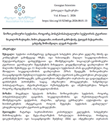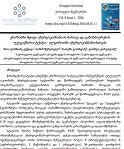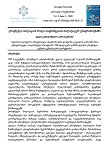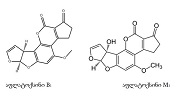Modern Reality of Asymmetric Technological and Socio-Economic Development
Downloads
Asymmetric technological progress and its consequence – global socio-economic inequality, which began in the XVIII century – continue to exist even in the post-industrial era, serving as one of the reasons for the increase in the wealth gap between the income levels and opportunities of the rich and the poor populations of the world.The situation may be exacerbated in the post-pandemic (COVID-19) period, as the consequences of the epidemic, especially in developing countries, hundreds of millions of workplaces will vanish, incomes of the entire populations will decrease, and global hunger and nutritional deficiency will take place.In the given complicated situation, developed countries and regions should accelerate – rather than halt – technological progress; however, it should be driven not by the need to make the rich even wealthier; it should be driven by the need to help the financially vulnerable and the need to improve their living conditions.In turn, developing countries and regions should implement state policies for innovation development, mobilize their resources and continually try to introduce new technologies on a massive scale.
Downloads
ჭითანავა, ნ. (2021). გლობალური გამოწვევები ერთპოლუსიან მსოფლიოში. თბ., „ივერიონი“. გვ. 178 / Chitanava, N. (2021). Globaluri gamotsvevebi ertpolusian msoflioshi. Tb., “Iverioni”. p. 178 (in Georgian).
https://gtmarket.ru/ratings/gross-national-income-ranking
UNCTAD. Impact of the COVID-19 Pandemic on Trade and Development. UNITED NATIONS. Geneva, 2020.
UNCTAD. TECHNOLOGY AND INNOVATION REPORT 2021. Catching technological waves Innovation with equity. United Nations publication issued by the United Nations Conference on Trade and Development. Geneva, 2021.
Kurz R. Schwarzbuch Kapitalismus Ein Abgesang auf die Marktwirtschaft. Frankfurt am Main: Eichborn Verlag AG, 1999. с. 127.
Ковалев Ю. Ю. Инновационный сектор мировой экономики: понятия, концепции, индикаторы развития. Екатеринбург. 2016. с. 19. / Kovalev Y. Y. Innovacionnii cektor mirovoi ekonomiki: poniatia, koncepcii, indikatori razvitia. Ekaterinburg. 2016. p. 19 (in Russian).
Laurent E. Demokratisch, gerecht, nachhaltig: Die Perspektive der sozial-ökologie. Bern: Rotpunktverlag, 2012. p. 154.
Моисеев Н. Н. Судьба цивилизации. Путь разума. М., 1998. с. 70 / Moiseev N. N. Sudba civilizacii. Put razuma. M., 1998. p. 70 (in Russian).
OECD (2014), Shifting Gear: Policy Challenges for the next 50 Years. P. 1. URL: https://www.oecd.org/eco/growth/Shifting%20gear.pdf
WHO Global Ambient Air Quality Database (update 2018).

This work is licensed under a Creative Commons Attribution-NonCommercial-NoDerivatives 4.0 International License.


























































































































































































































